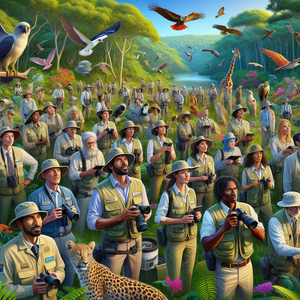
Navigating Career Paths in Forestry: A Sustainable Future Awaits
The forestry sector is experiencing a renaissance, driven by a growing emphasis on sustainable practices and the management of our vital ecosystems. This guide serves as a roadmap for those interested in exploring diverse career opportunities within forestry. From hands-on fieldwork to strategic managerial roles, the industry offers a wealth of paths that appeal to both recent graduates and those looking to make a career change. Industry experts agree on the importance of gaining practical experience, often suggesting that internships or volunteer work can serve as invaluable entry points. With a range of positions such as foresters, wildland firefighters, and urban foresters, individuals have the chance not only to advance their careers but also to make significant contributions to environmental health and community well-being. As we examine various job titles in forestry, we will highlight their responsibilities, qualifications, and the essential role each plays in fostering sustainability and enhancing community engagement.
Job Summaries:
Forester:
- Foresters manage and conserve forested lands using sustainable practices.
- A bachelor’s degree in forestry or a related field is essential.
- Strong analytical and communication skills are important for foresters.
- Foresters are crucial in maintaining healthy ecosystems.
Forest Ranger:
- Forest rangers protect public lands.
- Educate visitors on conservation.
- Enforce land use regulations.
- Typically hold degrees in forestry or environmental science.
- Possess exceptional problem-solving abilities.
Wildland Firefighter:
- Wildland firefighters defend against forest fires.
- Requires teamwork and training in fire management techniques.
- A high school diploma is the minimum educational requirement.
- Certifications enhance employment prospects.
Urban Forester:
- Urban foresters manage tree populations in cities.
- Assess urban canopy coverage.
- Collaborate with city planners.
- A degree in forestry, horticulture, or environmental science is typically required.
Forest Technician:
- Forest technicians support foresters by collecting data.
- They manage inventories.
- They conduct field assessments.
- A degree in forestry or environmental science is usually necessary.
Wildlife Biologist:
- Wildlife biologists study animal populations and habitats.
- They require a bachelor’s degree in wildlife biology or ecology.
- They often collaborate with government agencies to develop conservation policies.
Environmental Consultant:
- Environmental consultants advise on compliance with environmental regulations and sustainable practices.
- A degree in environmental science or ecology is crucial for this role.
Forest Policy Analyst:
- Forest policy analysts evaluate and develop policies related to forest management.
- A background in public policy or environmental science is needed.
Conservation Scientist:
- Conservation scientists manage land quality and create management plans to protect ecosystems.
- A degree in forestry or environmental science is usually required.
Timber Cruiser:
- Timber cruisers assess timber quality and quantity
- They provide data for logging operations
- A degree in forestry or a related field is needed
Soil Conservation Technician:
- Soil conservation technicians focus on preserving soil resources and maintaining forest health.
- A background in environmental science or agriculture is typically required.
GIS Specialist:
- GIS specialists analyze spatial data related to forestry
- Requires a degree in geography or GIS technology
- This role is crucial for data-driven decisions.
Forestry Educator:
- Forestry educators teach about forest management and conservation
- Often requiring a degree in forestry or education
Forest Health Specialist:
- Forest health specialists monitor ecosystems.
- Develop management strategies to mitigate risks.
- A degree in forestry or ecology is typically required.
Sustainable Forestry Consultant:
- Sustainable forestry consultants recommend responsible forest management practices
- Often requiring a background in forestry or environmental science.
Forestry Equipment Technician:
- Forestry equipment technicians maintain and repair machinery used in forestry operations.
- A high school diploma with technical training is typically required.
Ecologist:
- Ecologists study ecosystems and their interactions
- Requires a degree in ecology or environmental science
Arborist:
- Arborists specialize in tree care
- Assessing tree health
- Managing pest control
- A degree in horticulture or arboriculture is generally required.
Land Surveyor:
- Land surveyors measure and map land features.
- They provide essential data for forestry management.
- A degree in surveying or a related field is typically required.
Forest Management Planner:
- Forest management planners develop strategies for sustainable forest use.
- Requires a degree in forestry or environmental science.
This guide provides a comprehensive overview of the wide array of career options available in forestry, allowing aspiring professionals and career changers to explore the many opportunities in this vital field. Each position contributes uniquely to sustainability, environmental health, and community engagement, making forestry not just a career but a meaningful vocation. As the sector continues to evolve, individuals equipped with the right skills and passion can significantly influence forest management and conservation efforts, ensuring a healthier planet for generations to come.
Explore More Jobs

